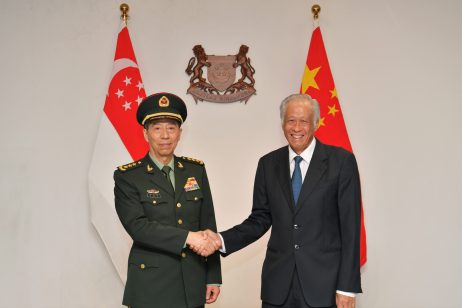
China and Singapore have recently made an important announcement that they will be working towards the establishment of a high-level defense communications hotline. This development comes at a time of increasing strategic competition between Beijing and Washington. The Chinese Defense Minister, Gen. Li Shangfu, and his Singaporean counterpart, Ng Eng Hen, signed a memorandum of understanding, signaling their commitment to establishing a secure telephone link for high-level communications between their defense leaders. The Singaporean government emphasized the significance of such open lines of communication in strengthening mutual understanding and trust.
While no specific timeline has been announced for the establishment of the hotline, this development is a welcome one. It signifies the creation of a high-level communications link between the Chinese government and one of the United States’ most reliable partners in Southeast Asia. Given the current state of mutual hostility between Washington and Beijing, the establishment of a secure and trusted communication channel is crucial.
During the Cold War, reliable and mutually trusted communication channels played a vital role in stabilizing the relationship between the United States and the Soviet Union. They helped defuse potential conflicts and maintain a certain level of understanding between the two superpowers. While a hotline was established between Washington and Beijing in late 2007, its use has not been institutionalized. In fact, China has shown reluctance to utilize the hotline in the past. Kurt Campbell, the Biden administration’s policy coordinator for the Indo-Pacific, revealed that the few times it was used, the hotline went unanswered for hours. This lack of response reflects the need for a more consistent and effective communication mechanism.
The announcement of a defense hotline between China and Singapore follows the establishment of a similar hotline between China and Japan in March. This trend highlights the importance of maintaining open lines of communication between nations in the region. However, it also comes at a time when U.S.-China relations are strained. Recent incidents, such as the Chinese balloon incident, growing tensions over Taiwan, and U.S. sanctions on China, have hindered hopes for a rapprochement between the two countries. Direct communication between top Chinese and American military officials has been virtually non-existent for months, despite President Joe Biden’s claim that the relationship between the two nations would soon improve.
In this context, the rejection of a meeting request from U.S. Defense Secretary Lloyd Austin by Chinese Defense Minister Li Shangfu during the Shangri-La Dialogue is significant. Li stated that he would only accept a meeting if the U.S. lifts the sanctions imposed on him in 2018, a condition that the U.S. refused. The Chinese government’s spokesperson, Tan Kefei, explained that the rejection was due to the U.S. disregarding China’s concerns and creating unnecessary obstacles. This exchange further underscores the challenges faced in establishing effective communication between the two countries.
The impending establishment of a Singapore-China hotline also reflects Singapore’s delicate balancing act in maintaining close relationships with both China and the United States. In late April and early May, the two nations conducted joint military exercises on land and sea. These exercises marked the first collaboration since a combined naval exercise in the South China Sea in September 2021, which was seen as a confidence-building measure, enhancing mutual trust and military cooperation between the two countries. Singapore’s statement emphasized the regular interaction between both defense establishments through bilateral and multilateral exercises, highlighting the long-standing and friendly relations between China and Singapore.
In conclusion, the announcement of a high-level defense communications hotline between China and Singapore is a significant step towards fostering greater understanding and trust in a time of heightened strategic competition between Beijing and Washington. While the timeline for its establishment remains unclear, this development signals the importance of maintaining open channels of communication to prevent potential conflicts and stabilize relationships between nations. The establishment of a hotline between China and Japan earlier this year further emphasizes the need for effective communication mechanisms in the
